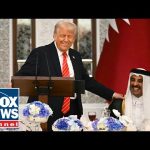In a bold move that sent ripples through the global political landscape, Qatar has announced a major agreement to purchase a staggering $42 billion worth of American military equipment. This includes the cutting-edge THAAD missile batteries, Pegasus refueling aircraft, and an array of armored vehicles. Alongside these heavy hitters, the list of prized items even features the state-of-the-art drones like the NQ-9B and the Sky Guardian. To say it’s the finest military hardware available is an understatement—it’s like giving a kid a new toy that’s cooler than anything else on the block!
President Trump, during his recent trip, took some time to address the military personnel stationed at a base in Qatar, boasting about the incredible economic wins the U.S. is racking up overseas. His speech was filled with gratitude as he honored the bravery of those serving in the U.S. military. The Commander-in-Chief expressed his appreciation for the sacrifices made by service members and their families, sparking excitement among those present. After all, who doesn’t love a shout-out, especially when it comes from the top? Furthermore, the President highlighted the importance of the military spouses waiting for their loved ones to return home, recognizing their silent yet significant role in the defense of the nation.
In the midst of these celebrations, some intriguing discussions are unfolding in the realm of international diplomacy. Reports recently surfaced about negotiations involving Iran, raising eyebrows and prompting skepticism. A proposal hinted at possibly allowing Iran to enrich uranium, but officials, including special envoy Harrison Fields, have quickly shut down any speculation. Under the current administration, Iran achieving a nuclear weapon is simply off the table. This firm stance is rooted in a commitment to national and global security, particularly concerning allies like Israel, who have a vested interest in the outcomes of these negotiations.
While President Trump has been making waves with Qatar, he’s not hesitating to tackle dilemmas closer to home. Navigating the choppy waters of foreign relations, he’s set to meet with the interim leader of Syria. This is no small feat, and many see it as a significant step toward changing decades of turmoil in the region. The President aims to foster economic partnerships that, hopefully, will lead to lasting peace. With a promise of “peace through strength,” he’s extending a hand, signaling a willingness to collaborate if the other side is on board. This approach, though risky, reflects a keen understanding of the geopolitical chess game being played on the world stage.
As the world watches these developments, President Trump’s diplomatic maneuvers continue to stir discussion and speculation. With a jam-packed agenda, he also keeps an eye on Ukraine, recently weighing in on the ongoing conflict with Russia. His administration’s track record of supporting Ukraine contrasts sharply with previous policies, illustrating a commitment to not just military aid but to peace, too. If President Trump had remained in office during the start of this conflict, the narrative might have unfolded quite differently, many believe.
In summary, President Trump’s visit to Qatar not only solidifies America’s defense alliances abroad but also provides a platform for continued efforts toward peace in the Middle East. As he engages with various leaders and navigates a mix of economic and military discussions, there’s a palpable sense of change in the air. The stakes are high, but as history demonstrates, bold actions could pave the way for a more stable and secure future—one can only hope, amidst the chaos, that we’re heading in the right direction!




